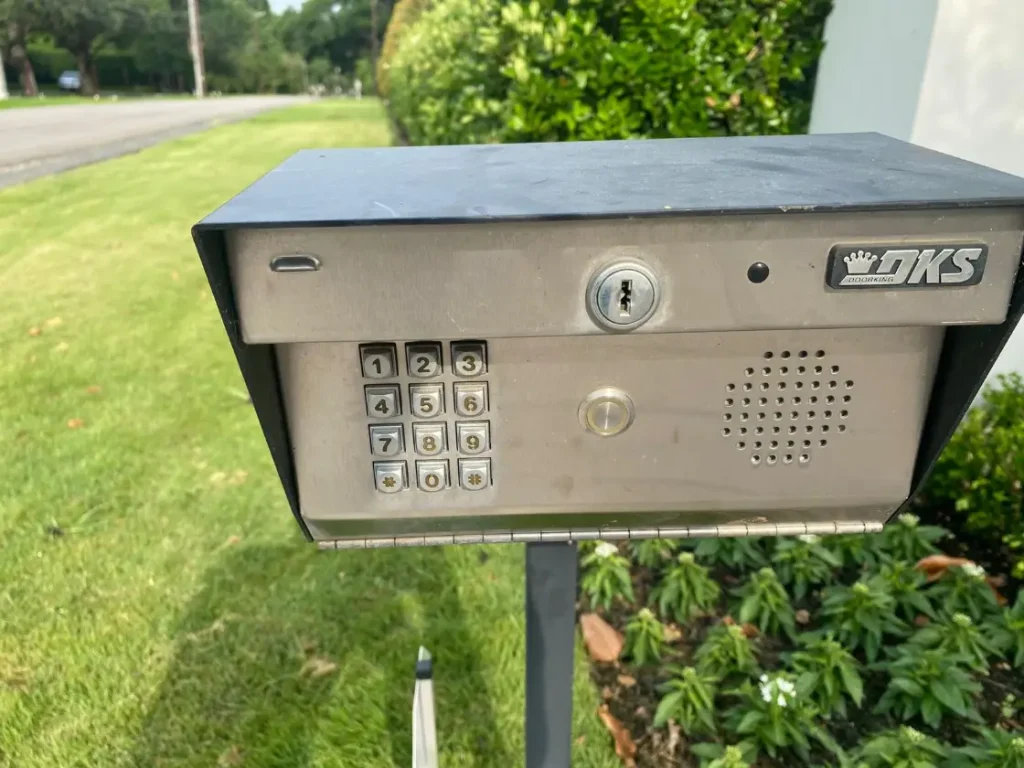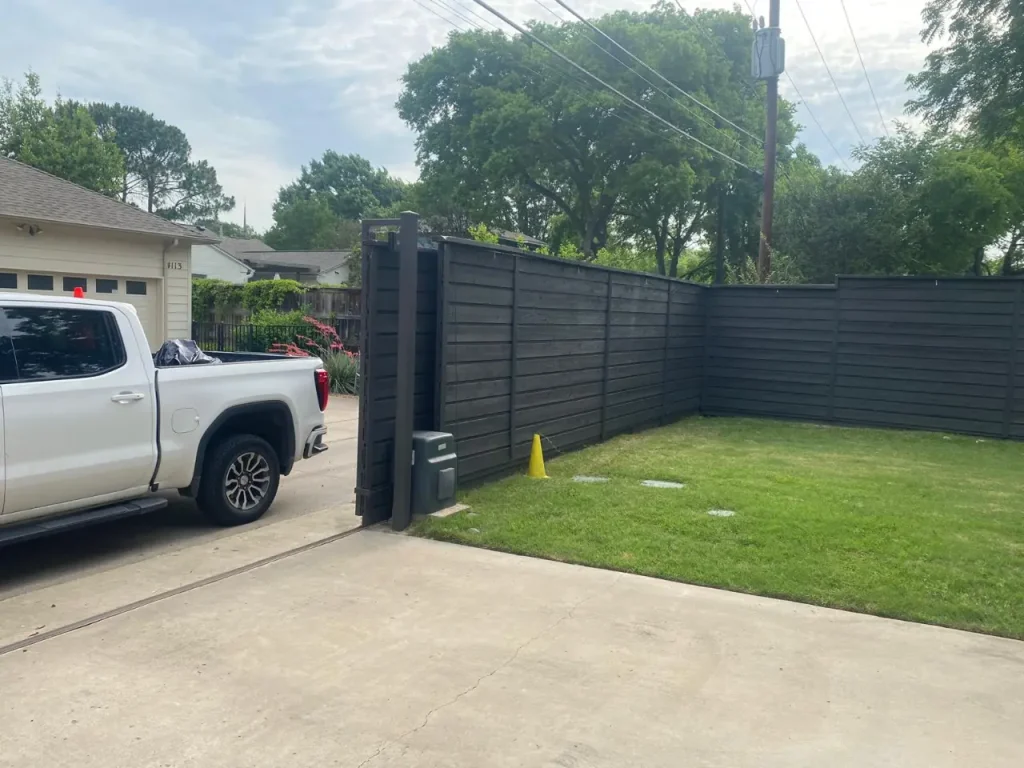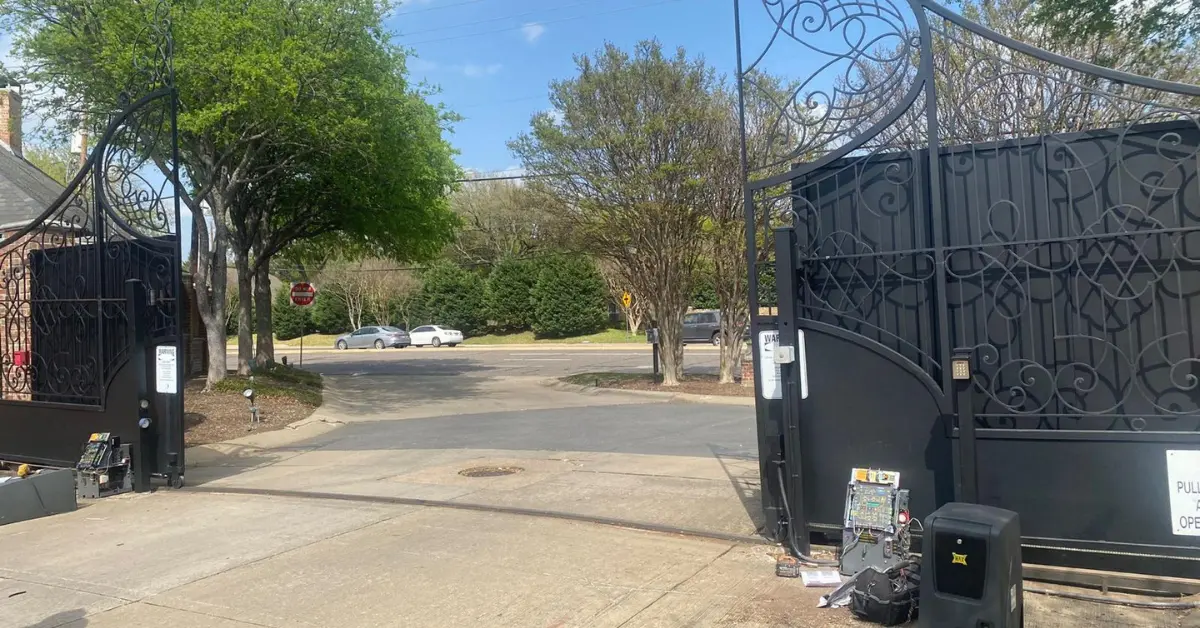When your driveway gate starts acting up, knowing what type you have makes all the difference. We’ve worked with both manual and automatic systems for years, and each comes with its own quirks. Manual gates require basic hardware maintenance, whereas electric gates can present challenges due to sensor and motor issues. Getting the proper driveway gate repair depends on understanding what’s really going on with your system.
How Manual Gates Work
Manual gates are pretty straightforward. You push or pull them open, and they swing or slide based on basic hardware. There’s no fancy electronics or motors involved hinges, latches, wheels, and frames doing their job. Most homeowners can handle minor adjustments themselves with the tools they have in their garage.
The beauty of manual systems is their simplicity. Fewer parts mean fewer things can go wrong. When something does break, it’s usually visible and easy to diagnose. Rust, worn hinges, or a bent frame are common culprits. A quick inspection usually reveals the problem right away, and driveway gate repair becomes much more manageable.

Common Manual Driveway Gate Repair Needs
Gate hinge repair tops the list for manual systems. Over time, hinges can wear down or rust due to exposure to the weather. You may notice that your gate is sagging or no longer closing properly. Replacing hinges isn’t complicated, but you must ensure that you have the right size and weight rating for your specific gate. Many driveway gate repair jobs we handle start with simple hinge issues that snowball.
Latch problems come in second. A broken latch compromises your driveway’s security significantly. Sometimes the metal wears down, or the alignment shifts as the ground settles. We’ve fixed plenty of these by adjusting the strike plate or installing a new locking mechanism. For swing gates, mainly, keeping hardware tight prevents bigger headaches down the road.
Understanding Automatic Gate Issues
Automatic gate systems are a different beast entirely. They rely on a gate opener, control board, sensors, and a power source working together. When one component fails, the entire system can cease to function. These gates offer convenience and enhanced security, but they require more attention and expertise when problems arise. That’s why automatic driveway gate repair often costs more than manual fixes.
The gate system comprises several moving parts that require regular inspection. Motors wear out over time, especially with heavy custom driveway gates. Sensors can get dirty or misaligned, causing the gate to stop mid-cycle. Even something as simple as a power surge can fry your control board and leave you stuck. Understanding these complexities helps you know when professional driveway gate repair becomes necessary.
Electric Driveway Gate Repair Challenges
Electric gate repair requires specialized knowledge that most homeowners lack. A technician needs to understand wiring, programming, and mechanical systems simultaneously. Troubleshooting sensor malfunction issues takes patience and the right diagnostic tools. You can’t just eyeball what’s wrong like you can with manual hardware.
Motor replacement ranks among the most common repairs we handle. A failing motor may produce grinding noises or cause the gate to move slowly. Sometimes motors from brands like LiftMaster need specific replacement parts. The repair service cost reflects both the part price and the skilled labor required to install it correctly. Quality driveway gate repair for electric systems protects your investment long term.
Gate Maintenance Tips for Both Systems
Regular maintenance prevents most emergency driveway gate repair calls we get. Both manual and automatic systems benefit from regular maintenance and attention. The good news is that basic upkeep isn’t rocket science. Spending a few minutes each season can save you hundreds of dollars later on in repairs.
Here’s what we recommend for keeping your gate running smoothly:
- Clean and lubricate hinges, wheels, and tracks every three months
- Check for rust spots and treat them immediately
- Test safety sensors monthly on automatic systems
- Tighten loose bolts and screws before they cause bigger problems
- Clear debris from the gate path and the surrounding area
For automatic gates, don’t forget about the electrical components. Inspect wiring for damage from weather or rodents. Keep your keypad clean and protected from rain. These small steps add years to your gate’s life and give you peace of mind knowing everything works when needed. Preventive care reduces the need for expensive driveway gate repair down the line.
Gate Maintenance Tips for Both SystemsGate Motor Problems and Sensor Malfunctions
Motor issues manifest in various ways, depending on your gate design. Slide gates put different stress on motors than swing gates do. Commercial gate systems run more cycles daily, wearing motors faster than residential setups. When your gate stops responding to the remote or keypad, the motor is often the culprit. This type of driveway gate repair requires technical expertise that most DIYers lack.
Sensor problems cause frustration because they’re not always obvious. Your gate might reverse randomly or refuse to close completely. Dirt on the sensor lens or misalignment from settling ground creates false readings. Access control systems rely on these sensors functioning properly. One malfunction puts your entire entry system at risk and demands immediate attention from a qualified repair service.
Weather plays a significant role in the frequency of repairs. In TX and other hot climates, electronics can overheat during the summer months. Cold weather can affect battery backup systems and cause motors to work harder. Understanding your local conditions helps predict when your gate needs extra attention and when to schedule driveway gate repair services.

When to Call a Professional for Driveway Gate Repair
You can tackle some repairs, but others require professional help. Knowing the difference saves time and prevents problems from getting worse. We’ve seen plenty of DIY attempts that ended up costing more than calling us first would have. There’s no shame in recognizing when expertise matters for your gate needs.
Call a repair service when dealing with any electrical component on an automatic system. Working with gate motors, control boards, or access control systems without training is dangerous. You risk electrocution and can damage expensive components beyond fixing. A qualified technician possesses the necessary tools and knowledge to diagnose issues safely and perform driveway gate repair work properly.
Complex mechanical problems also warrant professional help. If your custom driveway gates require major structural work or your gate installation wasn’t done correctly initially, seek expert assistance. For businesses with commercial gate setups, downtime costs money. Professional repairs get you back up and running faster than trial-and-error approaches.
Keeping Your Driveway Security Strong
Your gate serves as the first line of defense for your property. Whether manual or automatic, a broken gate compromises safety and privacy. Quick response to problems maintains the security you’re counting on. Don’t let minor issues turn into vulnerabilities that put your home or business at risk. Timely driveway gate repair ensures your property stays protected around the clock.
Modern access systems and entry systems offer incredible convenience when they work correctly. Smart technology integration with intercoms and remote access gives you control from anywhere. However, these advanced features are meaningless if the physical gate won’t move. Balancing high-tech solutions with solid mechanical maintenance creates the highest quality security setup.
Regular professional inspections catch problems early across all gate types. A trained eye identifies wear patterns before they lead to failures. This proactive approach to repair and maintenance ensures your gate remains functional year after year. The investment in quality gate service pays off through the reliability and longevity you can count on.
FAQ
How often should I schedule maintenance for my automatic gate?
We recommend professional maintenance every six months for automatic systems. This detects sensor drift, motor wear, and electrical issues before they lead to failures. If you use your gate frequently or have a commercial setup, quarterly service makes more sense.
Can I convert my manual gate to automatic later?
Yes, most manual gates can be retrofitted with a gate opener system. A technician will first assess the weight, size, and condition of your existing gate. The conversion works best when your manual gate is in good structural shape.
What's the average lifespan of an automatic gate motor?
Quality motors typically last 10-15 years with proper maintenance. Heavy use, extreme weather, and larger gate weight reduce this timeframe. Regular lubrication and keeping the gate balanced significantly extend motor life.
Why does my automatic gate stop halfway sometimes?
This usually indicates a sensor issue or obstruction detection safety feature activating. Check for debris in the path and clean your sensors. If the problem persists, the control board settings may need to be adjusted by a professional.
Are manual gates more secure than automatic ones?
Both can be equally secure when properly maintained. Automatic gates provide an added layer of security through access control features such as keypads and intercoms. Manual gates rely more on physical locks and your vigilance about closing them.

